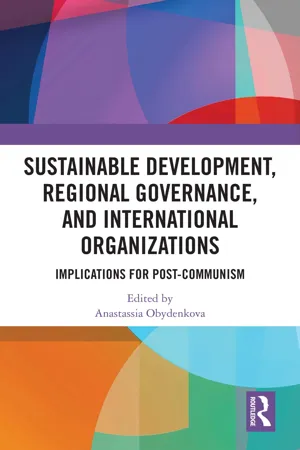
Sustainable Development, Regional Governance, and International Organizations
Implications for Post-Communism
- 172 pages
- English
- ePUB (mobile friendly)
- Available on iOS & Android
Sustainable Development, Regional Governance, and International Organizations
Implications for Post-Communism
About This Book
This book aspires to establish a dialogue among the studies of sustainable development, global environmental politics, comparative regionalism, and area studies of Eurasia. The chapters in this book reflect deep knowledge of the authors of the main trends in environmental politics at global, international, and national levels before the invasion in Ukraine in 2022. First, the book looks into the role and impact of international organizations such as the European Union (EU), European Bank for Reconstruction and Development (EBRD), Arctic Council (AC, ) and Global Forums on Climate Action on post-Communist states, but also the role of nation-states (e.g., Russia, Kazakhstan, and China). Second, the book explores relatively new international organizations, such as the Eurasian Economic Union (EAEU), the Eurasian Development Bank, and the Shanghai Cooperation Organization (SCO). How do the EAEU, EDB, and the SCO matter, if at all, in promoting an environmental agenda? How do the EU, EBRD, and the AC advance the environmental agenda across the post-Communist region? This book aspires to answer these questions and to shed more light on the challenges to sustainable development in post-Communist Europe, Central Asia, and Eurasia.
With a new foreword and afterword, this book will appeal to students, scholars and researchers of political science, international relations, area-studies as well as practitioners and policymakers working in international organizations and dealing with challenges of sustainable development. The other chapters were originally published as a special issue of Problems of Post-Communism.
Frequently asked questions
Information
Table of contents
- Cover
- Endorsement Page
- Half Title
- Title Page
- Copyright Page
- Table of Contents
- Citation Information
- Notes on Contributors
- Foreword: Regionalism, Environmentalism and Developmentalism in Post-Communist Eurasia
- Environmental Regionalism and International Organizations: Implications for Post-Communism
- 1 Sustainable Development Agendas of Regional International Organizations: The European Bank of Reconstruction and Development and the Eurasian Development Bank
- 2 Part of the Problem? The Eurasian Economic Union and Environmental Challenges in the Former Soviet Union
- 3 The Nexus between Authoritarian and Environmental Regionalism: An Analysis of China’s Driving Role in the Shanghai Cooperation Organization
- 4 Regime, Climate, and Region in Transition: Russian Participation in the Arctic Council
- 5 Why Climate? The Drivers of the European Union’s Climate Governance in Its Post-Soviet East European Neighbors
- 6 Natural Allies? External Governance and Environmental Civil Society Organizations in the EU’s Eastern Partnership
- 7 Post-Communist Countries’ Participation in Global Forums on Climate Action
- 8 Environmental Challenges and Political Regime Transition: The Role of Historical Legacies and the European Union in Eurasia
- 9 Whose World? Discourses of Protection for Land, Environment, and Natural Resources in Kazakhstan
- 10 Foreign Policy, National Interests, and Environmental Positioning: Russia’s Post Paris Climate Change Actions, Discourse, and Engagement
- 11 Sustainable Development and Actors of Regional Environmental Governance: Eurasia at the Crossroads
- Afterword
- Index